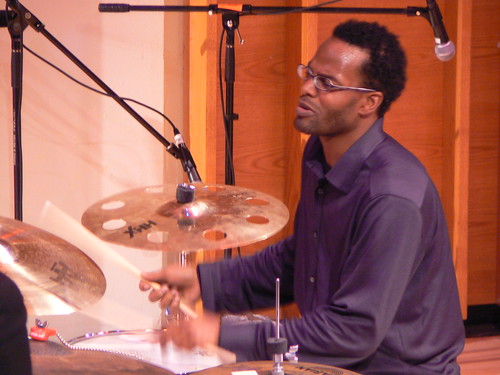 The downside of attending the annual Detroit International Jazz Festival press conference is you have to sit through a bunch of boring speeches from City Council members, and corporate sponsors, going on and on about why the jazz festival is relevant. The past two years, a certain council member has recited the same speech of how as a lad how he looked forward to attending the annual event with his dad who was an avid jazz enthusiast. As if the attendees who rearranged their work schedules to make the press conference gave a damn about his boyhood recollections. I've been going to the festival for a decade. I've never seen him there. After the conference, I planned to test the council member to find out if he love jazz as much as he claims. I didn't get a chance because he left after his I-love-jazz-so-much speech. A genuine fan of the music would've stuck around to hear Mulgrew Miller, the festival's artist in residence, perform.
The downside of attending the annual Detroit International Jazz Festival press conference is you have to sit through a bunch of boring speeches from City Council members, and corporate sponsors, going on and on about why the jazz festival is relevant. The past two years, a certain council member has recited the same speech of how as a lad how he looked forward to attending the annual event with his dad who was an avid jazz enthusiast. As if the attendees who rearranged their work schedules to make the press conference gave a damn about his boyhood recollections. I've been going to the festival for a decade. I've never seen him there. After the conference, I planned to test the council member to find out if he love jazz as much as he claims. I didn't get a chance because he left after his I-love-jazz-so-much speech. A genuine fan of the music would've stuck around to hear Mulgrew Miller, the festival's artist in residence, perform.The rep from Chase Bank remarks really took the prize. She talked about how the media is guilty of bashing the banking industry. She alleged the media rarely reports all the good banks do. I guess the institutions goodwill should trump charging their customers 29% interest on credit cards and hefty overdraft fees. Their customers they claim to love so much could get lower interest rates from a loan shark. Her "bank bashing" remarks were asinine, and I wanted to boo her, but I decided not to.
After the speeches, the jazz festival's artistic director, Terri Pontremoli, announced the lineup. The festival theme is "Flame Keepers". The lineup is loaded with jazz all-stars. Pontremoli booked Matt Wilson, Terence Blanchard, Branford Marsalis, Kenny Barron, Bobby Watson, Tia Fuller, Randy Brecker, Kenny Green, Maria Schnieder, Donald Harrison, Kurt Elling, Louis Hayes, Eddie Henderson and Danilo Perez. That's enough music to last a lifetime, but there's more. Pontremoli has made the festival more smooth jazz friendly by including of its most celebrated proponents saxophonist Kurt Whalum. He will perform the music of Donnie Hathaway.
Pontremoli has done a bang up job since becoming the artistic director, but she's not without sin. She didn't say which regional jazz musicians and bands who will participate. Regional cats always complain about mistreatment from the festival brass. Not announcing which Michiganders will perform seemed odd. I wonder if the brass consider regional acts priority.
Drummer Roy Haynes, who's in his late 80's and who's still swinging will perform with his Fountain of Youth band. If we're lucky, Haynes will perform some material from his classic albums "Cymbalism," "Out of the Afternoon" and "Cracklin'". People familiar with pianist Mulgrew Miller will be able to experience him in many incarnations.
If you're unfamiliar with Mulgrew's prodigious chops, I recommend you track down his albums “Mulgrew Miller Live at Yoshi's Vol. 1 and Vol. 2.”. Live is the best context to experience the pianist. His elegance and swing ability will catch you off guard. Someday, those are destined to be classics. Pontremoli like to end with a bang, so The Manhattan Transfer will close out the festival. There’s a lot of music scheduled. You should bring an extra set of ears. Let me know if you spot a council.






